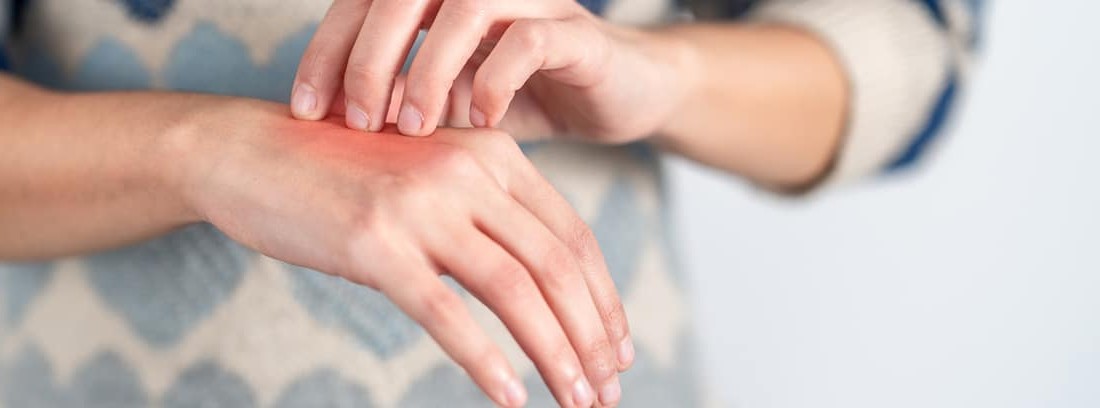Skin problems caused by anti-Covid masks and gels

The economic, psychological, medical ... Sometimes directly and others indirectly, the covid-19 has had important consequences for people's health. Next, we are going to see the consequences of the continued use of,, soaps and disinfectants for our skin.
1. Atopic dermatitis
Atopic dermatitis is a itchy inflammation that causes itching and it can be acute, subacute or mainly chronic, frequently related to a family or personal history of asthma, rhinitis or allergy, in general. It is a hereditary clinical state in which patients have the very dry skin with intense irritation. Constant scratching aggravates the condition.
2. Irritant contact dermatitis
It is an acute or chronic inflammatory reaction of the skin due to exposure to chemicals irritants such as detergents, hydroalcoholic gels ... that come into contact with the skin.
It causes or redness, formation of vesicles or small blisters, erosion and cracking of the skin, formation of crusts or peeling and can lead to an inflammatory thickening of the skin. Will heal spontaneously if exposures are not repeated, whereas if exposures are perpetuated, the condition may become chronic.
3. Seborrheic dermatitis
very common characterized by redness and peeling cutaneous in regions where the sebaceous glands (glands that produce sebum or natural skin fat) are more active, such as the face and scalp, as well as in the folds of the body. The itchiness that it can generate is aggravated by sweat.
4. Acne
Is a inflammation of the pilosebaceous units of certain areas of the body (face and trunk), which can become serious. It can present as comedones, papulopustules, or nodules and cysts.
Mask wear causes a moisture-laden “occlusion” from exhaled air and can lead to a disturbance on the skin's natural defensive barrier. However, it is proven that emotional stress causes.
5. Rosacea
The is a chronic acneiform disorder of the pilosebaceous units of the face together with an increase in the reactivity of the capillaries (small blood vessels) to heat. This produces a blush and, ultimately, telangiectasias ("Spider veins"). Exposure to heat can cause exacerbations.
6. Urticaria and angioedema
They manifest as transient hives or edematous plaques filled with water and large edematous areas, almost always pruritic that cause itching and affect the most superficial dermis () or the deeper subcutaneous tissue (angioedema). Up to approximately 15-25% of the population may have an episode of this problem at some point in their life. The relationship with the elements used in the pandemic is that it can be triggered by physical stimuli (cold, pressure or vibration ...).
How can we prevent it?
Prevention will be based on carrying out a daily skin care, depending on the characteristics of each case, that is, depending on whether you have a skin normal, dry or mixed / oily, since each one will have specific needs:
- Dry skin will require products whose formulation includes a higher proportion of moisturizing and soothing active ingredients
- Oily skin they will need grease-free cosmetics with a high detergency capacity
In general, it will be appropriate to carry out a daily skin cleansing to remove dirt residues derived from environmental pollution, sweat, sebum, accumulation of bacteria, makeup residues ... by use of a cosmetic cleaner and it is recommended to complete the treatment by using a tonic later.
Water can dry out the skin
The use of water to clean the skin, although it seems paradoxical, can cause intense dryness in it, by favoring the evaporation of the aqueous content present in the horny layer (most superficial layer) of the skin.
You have doubts?Sign up for Savia, MAPFRE's digital health services platform that allows you to speak for free by chat or video consultation immediately with a doctor to resolve any medical questions.
In addition, you can buy one directly in Savia and book your appointment as soon as possible.
SIGN UP FREE
(Updated at Apr 13 / 2024)